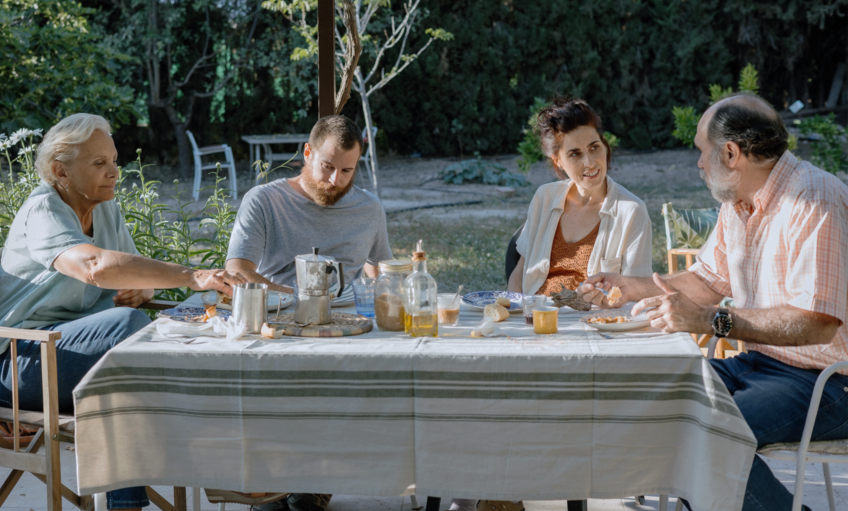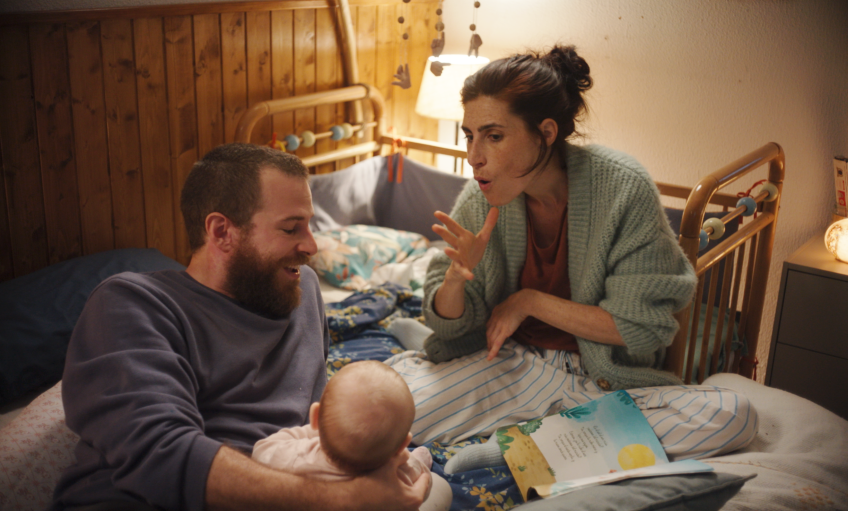Joyce Glasser reviews Deaf (September 12, 2025) Cert 12A, 100 mins.
Audiences with normal auditory functions might wonder why writer-director Eva Libertad spends so much of the first part of her film, Deaf, with meandering scenes with family and friends celebrating the news that the film’s beaming protagonist, Ángela (deaf actress Miriam Garlo, in a brilliant performance ), is pregnant. Hang in there, as there’s method in this indulgence.
Whatever insecurities Ángela feels, she is now happily married to Héctor (Álvaro Cervantes), a devoted, hearing husband who is fluent in sign language. She is also a valued member of small pottery making company where she enjoys a close relationship with her colleagues and brings home money.
Now, it’s as if Ángela is also validated as a normal woman – too – soon to join all the other, albeit mostly younger – mothers of the world. How normal it feels to be appraising friends’ unneeded buggies and spending the last “free” summer swimming with Héctor.
Deaf audiences, or those with deaf relatives, might already anticipate the issues that build slowly and become the film’s tension and narrative.

The first issue is addressed in the scene where Ángela and Héctor go to the doctor to learn, based on family history, if the baby will be deaf. The doctor concludes there is a 50-50 chance either way and they won’t know until the baby is born. Both parents take the news well. They are still enthralled at the prospect of a child: any child.
Then there are Ángela’s parents, Elvira (Elena Irureta) and Fede (Joaquín Notario), who have not been told the news when they come for lunch in the couple’s sunny garden where they cultivate vegetables and keep chickens. In a telling early scene we feel the tension between Ángela and her well-meaning, but thoughtless hearing mother.
When Elvira comments on how serene her daughter appears, Ángela is not really joking when she points out that it puts Elvira’s mind at ease that her daughter is with a “hearing man” at last, as though satisfying her parents’ dreams. Provocatively – because Ángela resents life’s inequalities – she goes further joking that with Ángela settled, ‘it’s time to give the grandparents a grandchild.’
Elvira’s reaction is not expected. Instead of anticipating the news, Elvira shakes her head, commenting, ‘you’re fine the way you are,’ and adding ‘you don’t need that.’ But “that” is what is coming and when Ángela chooses that minute to announce the news, the parents find an excuse for their surprise, saying ‘we didn’t expect it – at your age.’
Things do not go much better when her parents take Ángela shopping for a new hearing aid. Ángela tells them not to help and is further annoyed when the salesman does not know sign language to answer her questions. Elvira, told to buy what she wants, tries to explain that being a new mother is hard enough for anyone, and that Ángela should welcome whatever might help.
Ángela’s pregnancy is generally a joyful period, thanks to Héctor and Ángela’s support group of deaf girlfriends who compare stories of their pregnancies, giving Ángela confidence that she is not alone.

When the time comes to go to the hospital, Ángela panics that she will not understand the instructions – another unforeseen trial for a deaf mother-to-be. Again, Héctor will be there to smooth the way. The birth is agonising but the birth of a healthy baby girl is a relief to all, as is the news that little Ona has perfect hearing.
Soon, however, Ángela begins to notice the downside, for her, of the child’s good fortune. In playgroups, nursery and interacting with other children and parents, increasingly Héctor takes charge, because on a practical level, they are all speaking Spanish, and playing music, singing along, and reading stories without signing. There are schools for deaf children, but here, it’s not the child who is deaf.
Already, a good cook and provider who shares the domestic chores with his wife, Héctor becomes the main carer for their child, too. Ángela wants the child to be given the best start in life, but she holds it against Héctor that he is not doing enough to bring her up “bilingual.” As Ángela feels her role in the family is diminishing and her connection to the baby fading, she reaches breaking point.
The importance of Deaf and Libertad’s artistry, is that, without melodrama or didacticism, a veil is lifted for audiences who have never even thought about, let alone experienced the challenges of a mixed ability family, particularly on the parent left out.




